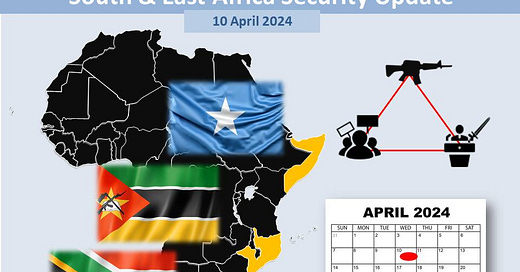East & Southern Africa Security Update 10 April 2024
Source : ACLED
Somalia Update.
Over the last week or more Somali government forces have been conducting operations against Al Shabaab militants in the southwest of the country including the regions of Galmudug, Hirshabelle and Southwest. These operations are reprisals, done in retaliation for previous incidents earlier this month in which Al Shabaab forces attacked a hotel, the presidential palace and military bases in the region of Mogadishu and the lower Shabelle.
Al Shabaab activity has surged in recent weeks, driven both by a need for propagandistic accomplishments during the Islamic holy month of Ramadan and the desire to impact the countries upcoming state elections in Galmudug and Hirshabelle states where clan disputes over leadership threaten to break the unity of local anti Al- Shabaab coalitions.
Those operating in Somalia, particularly the Southwest, are advised to take extreme caution when travelling in these areas as there is still risk of both military escalation between Al Shabaab & government forces and of political violence between regional clans.
Mozambican Quick Reaction forces recieving training. With the withdrawal of SADC forces looming, the capacity of lcoal governemnt forces is once more in the spotlight.
Source : Africa Defence Forum.
Mozambique Update.
The SADC mission in Mozambique (SAMIM) ,which has seen over two thousand Southern African troops deployed in the northern region of Cabo Delgado is now slated to officially end in June of this year. However, this deployment appears to have fallen short of achieving its goal, with militant activity surging and local displacements on the rise.
The general consensus which had emerged from the SADC leadership troika (South Africa, Namibia & Zambia) assessment of the Cabo Delgado situation in July 2023 – that of a broadly successful mission that had succeeded in dramatically curbing local militant’s activity – Is now under threat as the situation on the ground has begun to deteriorate. A fresh spate of attacks, some of them in areas previously left untouched by rebel activity since the start of violence in 2017 has highlighted that the insurgency still remains some of its former strength and calls into question whether the remaining forces, including local Mozambicans and Rwandan expeditionaries, will have the necessary capacity to counteract them.
The upcoming end of the SAMIM deployment raises serious concerns around the ability of regional actors to handle the crisis. Dispersions have been cast over the efficacy of SADC troops, especially in light of their redeployment to the Eastern DRC. Just as pressing are questions over the political will of the Mozambican government, who’s decades long ambivalence towards the Cabo Delgado region and slow response to the initial crisis in 2017 did much to contribute to militants initial success.
Amid the rising risk of militant attacks it is advisable to avoid the Cabo Delgado region unless absolutely necessary. Regional operators should pay close attention to any news regarding atatcks in the town of Pemba, as this could be a prelude to attacks on local LNG installations .
South African ex- President Jacob Zuma addressing supporters as leader of the country’s new MK party. Now back from political exile, the former political heavyweight is likely to play an outsized role in the country’s upcoming elections.
Source : BusinessLive
South Africa Update
Former South African President Jacob Zuma has been cleared to run in the countries upcoming elections. This decision by the courts, which overturns an earlier ban by the countries Independent Electoral Commission (IEC) will likely serve to lessen the risk of large scale civil unrest over the election period, which many prominent members of Zuma’s party had been threatening in the event that he was not present on the election ballot come May.
The former President, who has previously narrowly avoided a prison term for contempt of court due to ongoing corruption investigations has recently remerged on the local political scene as the head of uMkhonto we Sizwe, a party named after the former militant group which served as the armed wing of the current ruling party, the African National Congress during the apartheid period. The MK party has drawn notable support in a very short time, particularly among pro Zuma hardliners in KwaZulu-Natal and other regions and is widely seen as a potential kingmaker in an election year when the ruling party will dip below its comfortable electoral majority for the first time and be forced into picking a coalition government.
Recent threats of violence by high ranking members of the MK party including party youth head Bonginkosi Khanyile and Visvin Reddy, a leader within the KZN province highlight the incendiary role that the presence of MK could play within a country and region prone to political violence. Fortunately the compromise over Zuma’s eligibility to stand for elections has, in the medium term, tempered the risk of a repeat to the July 2021 riots when violent protests organized by pro Zuma factions escalated into widespread looting and property damage. Nevertheless, the KZN’s historical tendecy towards politicla violence and ncertainties surrounding the outcomes of coalition politics within the region could still lead to security risks to those with assets in the region.
Those operating within South Africa particularly within the Gauteng & KwaZulu Natal provinces are advised to be in a state of heightened readiness over the coming election and post-election periods. It is advisable to maintain contact with local private security forces and community watch organizations as these proved effective in preventing property damage during the previous bout of unrest in July of 2021. Those based in other parts of the country over the next month or more should still take precautions as violent protests are known to increase in frequency within South Africa during election periods.





